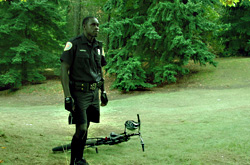OK, here’s where we’re supposed to throw impartiality aside and declare that we hate everything about this little local indie based on Charles Mudede’s police blotter column in The Stranger. Because at Seattle Weekly, we’re supposed to hate The Stranger, as they do us, and never miss the opportunity to kneecap the opposition. Or at least that’s what you might infer from various blogs and editorial sniping; a grudge-match rivalry—or the clever, one-way approximation of such—helps to move papers and generate publicity. By that logic, Stranger logic, I must surely declare that Police Beat sucks, right?
No, it doesn’t. I like the movie, seen at SIFF ’05, for its dreamy fidelity of tone, its eccentric parade of misdemeanor-doers, and its insistence that love—or one guy’s doubts about it—matters as much as civic law and order. Nothing much really happens in the film, but after Pirates of the Caribbean 2, that’s not such a bad thing. A series of first-person vignettes, Robinson Devor’s second feature (after The Woman Chaser) follows African immigrant bicycle cop “Z” (Senegalese soccer player Pape Sidy Niang) through a series of radio dispatches—some comical, some absurd, some poignant, some just plain dull. We hear his thoughts in Wolof (with subtitles) as he deals with drunks sleeping in hedges and kilted dudes shooting up empty mail trucks, but his mind is never really on business. He’s preoccupied with his possibly unfaithful girlfriend, away on a camping trip with a colleague. Mentally, Z’s in two places at once, and his work suffers for it. His partner (Eric Breedlove) is having an affair with a drug addict, and Z is completely oblivious to his boss’ advice—”Pay attention to everything.”
Instead, Z begins embellishing his police reports, just as his jealousy embellishes his worst imaginings about his vacationing girlfriend (Anna Oxygen). He becomes something of a writer, increasingly detached from his surroundings, which leads to Police Beat‘s somewhat tedious ratio of incident to writerly musing. For every kitten stuck in a tree, we must hear Z say, “All I’m really doing is talking to myself,” never a good sign in a movie. “Relationships are cruel,” he declares. “Therefore, the world is cruel.” Which would be equally profound, or not, if you replaced the word “cruel” with “happy” or “sad” or “oneiric” or “blueberry waffles.”
The sheer interiority of Z’s beat is like peering through the unwashed green fish-tank look of the film: There’s probably something interesting going on inside, but co-writers Devor and Mudede can’t be bothered to show us. Niang’s rather aloof physical presence does make him a gracefully, doubly displaced stranger, estranged from girlfriend, not quite at home with his shorelined home. But he’s surrounded by amateurish professional actors, all straining too hard to flesh out Mudede’s crime reports, themselves a blueish carbon copy removed from whatever the Seattle cops originally wrote.
By the time we see a guy scarfing down raw hamburger at a supermarket, lovesick Z’s commentary has become so removed as to seem irrelevant. So viscerally obsessed with his girlfriend, he can’t arrest the movie’s wan wandering away into the ether. This detracts from the zany specificity, the bizarrely mundane details, of Mudede’s core reporting. Woman attacked by tree limb, Lord of the Flies used as a threat, a perv masturbating to a parakeet—these incidents stand nicely on their own without benefit of a narrator. You’re left wanting more crime, less cop.








